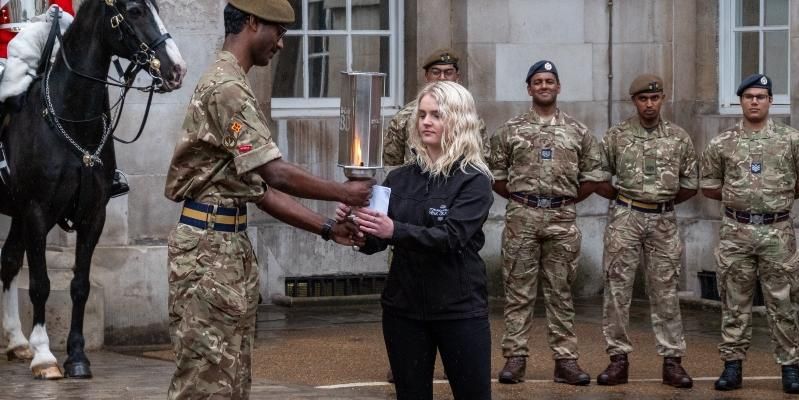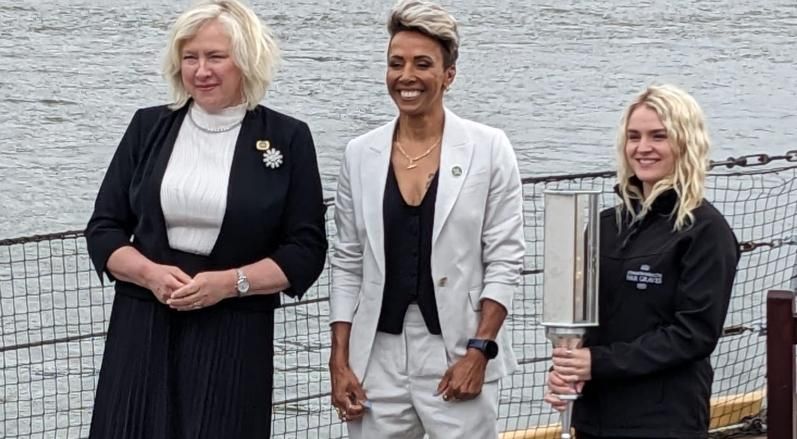
A University of Leeds student has played a key role in the 80th anniversary D-day celebrations.
Eleanor Dufton, a volunteer guide for the Commonwealth War Graves Commission (CWGC), joined Prime Minister Rishi Sunak at the Commission’s Lighting their Legacy launch on Horse Guards Parade.
The ceremony involves a torch being lit in the Capital which then tours the country before going to Normandy.
Following a chain including the Prime Minister and veterans, Eleanor was handed the torch as a representative of the young people of the country who will continue to honour those who died.
It didn’t dawn on me until later what a big deal this all was. I was just so pleased to have the opportunity.
“I was a bit nervous, but I was more concerned about not burning someone with the torch,” said Eleanor.
“It was really heavy and I found it a challenge holding it at the same time as reading my speech in which I emphasised how important it was to have that connection with the veterans who won’t always be here. I also had to shout so everybody could hear me and that wasn’t easy either!”
On meeting the Prime Minister Eleanor said: “He seemed genuinely nice and interested. It didn’t dawn on me until later what a big deal this all was. I was just so pleased to have the opportunity.”
Eleanor attended a private reception afterwards on HMS Belfast where she met Claire Horton, Director General of the Commonwealth War Graves Commission and Olympian Dame Kelly Holmes (pictured below).

She was interviewed by crews for national TV and then filmed for a video that will be shown in schools around the UK as part of the legacy programme.
“I know how vital it is that we keep the memory of these significant moments alive,” said Eleanor.
Now in her final year at University studying French and Spanish, Eleanor always had a fascination with history.
She said: “I did A-levels in languages and History and I chose to come to Leeds because I loved the flexibility the University offered in providing modules that enabled me to combine my passion for all these subjects.”
She learned about D-day in school and went on to discover more about the legacy of commemoration at Leeds through Professor Nina Wardleworth, Professor of Global French Studies and an expert in World War II and the French empire.
It was Nina that pointed her to the tour programme with the CWGC, for which Nina is herself a volunteer speaker.
I know that she will inspire her generation to learn about these important moments in our shared European and Global history.
Nina said: “Eleanor is a brilliant researcher and linguist who has worked hard to make her historical knowledge engaging and accessible to a wider range of publics from across the world.
“I am pleased and proud that that her passion has been recognised through this prestigious role for the CWGC. I know that she will inspire her generation to learn about these important moments in our shared European and global history.”
Eleanor spent 18 months in France and Spain, four months of which was an internship at the Memorial of Mont Valérien, on the outskirts of Paris – one of the country’s most important memorial sites – and also at the CWGC’s Thiepval Memorial on the Somme where she guided visitors from Britain and the Commonwealth.
Eleanor has since returned to France to take on a Senior Guide role at the Bayeux and Renville cemeteries.
Eleanor became a Laidlaw Scholar in her first year and spent six weeks researching how the French Caribbean community were involved in the internal resistance as part of her research placement with Nina.
Now, as her final year comes to an end, she is looking for sponsorship so she can do a Masters at Leeds on the commemoration of the contribution of French Caribbean veterans to the French war effort during World War II.
The Commission has started a five-year programme to address historical inequalities in the commemoration of the world wars to ensure that all those who died are remembered equally.
Eleanor said: “The history that was taught in post-war Britain did not recognise those forces from the Empire that fought in World War II but this is changing.”
Further information
Please contact Jane Lewis in the University of Leeds press office.